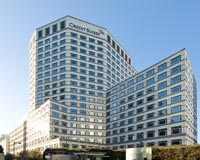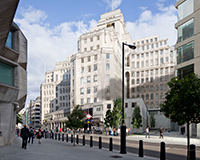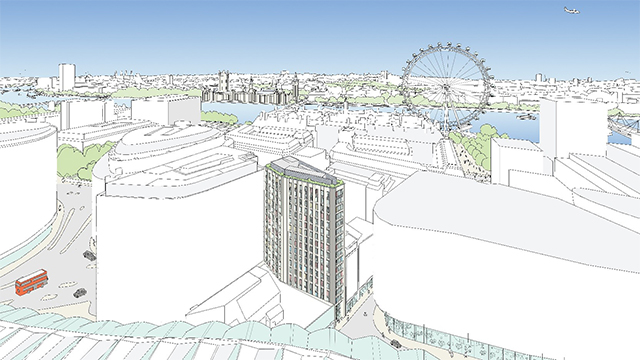Is London’s property investment market at an inflection point? For the first time this cycle, the Urban Land Institute has omitted the UK capital from its list of 10 European cities with the best investment prospects, citing concerns about overpricing.
Couple that with the black clouds of China, commodities and emerging market turmoil that skated over the horizon of the new year, and some fear the prospect of a downward spiral.
But for many, the microclimate remains encouraging: adequate if not stellar tenant demand and a severe lack of office and housing supply look likely to underpin growth, providing the basis for ongoing confidence in the market.
Which side prevails will take time to tell, given the illiquidity of commercial real estate. So here, EG examines five key trends to watch this year – plus potential asset sales that would exemplify them.
1 Cabot Square, E14
 Vendor The Qatar Investment Authority
Vendor The Qatar Investment Authority
Rationale The collapse in the price of oil is set to have a huge impact on the London real estate market, turning some perennial buyers into potential sellers for the first time but also encouraging vast numbers of private investors from oil-backed economies to diversify overseas, which could mean buying in the UK.
CBRE and JLL have been instructed by QIA to sell 1 Cabot Square, E14, seeking bids in the region of £450m, in what would be its first property sale.
The fund was set up to help the Gulf state diversify from its dependence on oil and gas and provide an alternative capital source which could be drawn from on a rainy day. With that rainy day apparently upon us, some of the biggest trophy sales this year could well be from those many had expected to be long-term owners.
The key question that poses for London is, if the sovereign wealth funds start selling their trophy assets, who will be the buyers?
160 Aldersgate, EC1
Potential vendor Mercer Real Estate
Rationale Private equity owners of London offices will continue to be major sellers this year. Many of those that simply bet on capital value growth when they bought early in the cycle have already sold over the past two years as yields compressed to record lows. This year, expect more fund managers who took on development risk to join the sellers as their slightly longer-term investment strategies mature.
There are dozens of private equity-backed developments that could be sold this year – not least those in Blackstone’s giant portfolio. But Mercer Real Estate’s 160 Aldersgate, EC1, while not currently on the market, looks a good early bet for disposal. DLA Piper has already let the majority of the 266,000 sq ft development and work is well underway. It would be surprising if Mercer wasn’t seriously tempted by any unsolicited bids.
55 Broadway, SW1
Vendor Transport for London
Rationale Government sales have been a feature of the London market for several years now but expect 2016 to see even more as the chancellor’s decision to impose market rents on government freeholds begins to hit Whitehall occupiers in tandem with ongoing budget squeezes. One of the first public sales on the horizon is Transport for London’s offices at 55 Broadway, SW1, which Knight Frank has been appointed to sell.
A consented redevelopment scheme has a gross internal area of 252,000 sq ft, most of which will be residential, and a potential gross development value of as much as £500m.
240 Blackfriars, SE1
Potential vendor The Great Ropemaker Partnership (Great Portland Estates and the BP Pension Fund)
Rationale Most of the big REITs and listed propcos have had huge development programmes over the past few years designed to take advantage of the white-hot London market.
Many of the large developments in those pipelines are now complete and fully let, and the temptation to cash out at or near the top of the market will be weighing on board members’ minds.
GPE’s South Bank office tower at 240 Blackfriars Road, SE1, looks a likely candidate for disposal and the fact it is held in joint venture with the BP Pension fund – itself keen to rebalance its asset allocation away from real estate, which has risen in value and now accounts for a larger portion of the portfolio – makes a sale all the more likely.
 CityPoint, 1 Ropemaker Street, EC2
CityPoint, 1 Ropemaker Street, EC2
Potential vendor Bondholders in the securitised loan that secured Beacon Capital Partners’ purchase
Rationale There are still legacy loans securing trophy assets in London that have yet to be untangled nearly eight years on from the collapse of Lehman Brothers. CityPoint is the obvious example. Its complex capital stack, which involves an underwater securitised loan that is now serviced by Mount Street and a junior loan owned by Brookfield, means a resolution has yet to be reached. However, with major tenant Simmons & Simmons set to regear its lease and bondholders no doubt conscious that the window to achieve an attractive sale could soon be closing, it seems more likely than ever this building will finally trade. That said, Brookfield looks in poll position to buy the asset even if a sale can be agreed, given its tactical purchase of the junior debt. The last public valuation was almost £500m – a figure that is sure to have risen substantially.
Market views
Duncan Walker, investment director, Helical Bar
“For the first time in a while, investors start the year with as much trepidation as optimism. Where there is a disparity between sentiment and fundamentals is where we tend to buy and I’m optimistic.”
Matthew Weiner, chief executive, U&I Group
“The whole market comes down to rental growth because cap rates are flat so the question is, are rents rising or flat? The most recent Deloitte CFO survey was very downbeat, earnings have fallen and consistently fallen. It is not the thing that you would say is necessarily a precursor to take-up.”
Tomáš Jurdák, managing director, HB Reavis UK
“The balance between supply and demand looks healthy but there are macroeconomic issues so there will be fewer investors this year. We have a strong belief in long-term London performance, so our strategy is to establish a dominant business here that will be more than 30% of our portfolio.”
Alastair Hilton, partner and head of investment, Farebrother
“The sub-£20m market is still incredibly competitive, so I see the market remaining strong. But there will be a move away from refurbs as there is some concern on the occupational side of things.”
Stephen Down, head of central London and international, Savills
“Sellers are likely to be those that bought in 2010 driven by improving commodity prices in their own domestic markets. Since the Malaysians bought in 2010, their currency has depreciated and there has been a big call to repatriate cash where they can.”
Sam Sananes, fund manager, UBS Global Real Estate
“I would expect volumes to be down this year but not significantly. Asian investors will be strong and North Americans very active. The best buildings will still see strong demand but anything that isn’t the best, in terms of location or quality, won’t hold up.”










